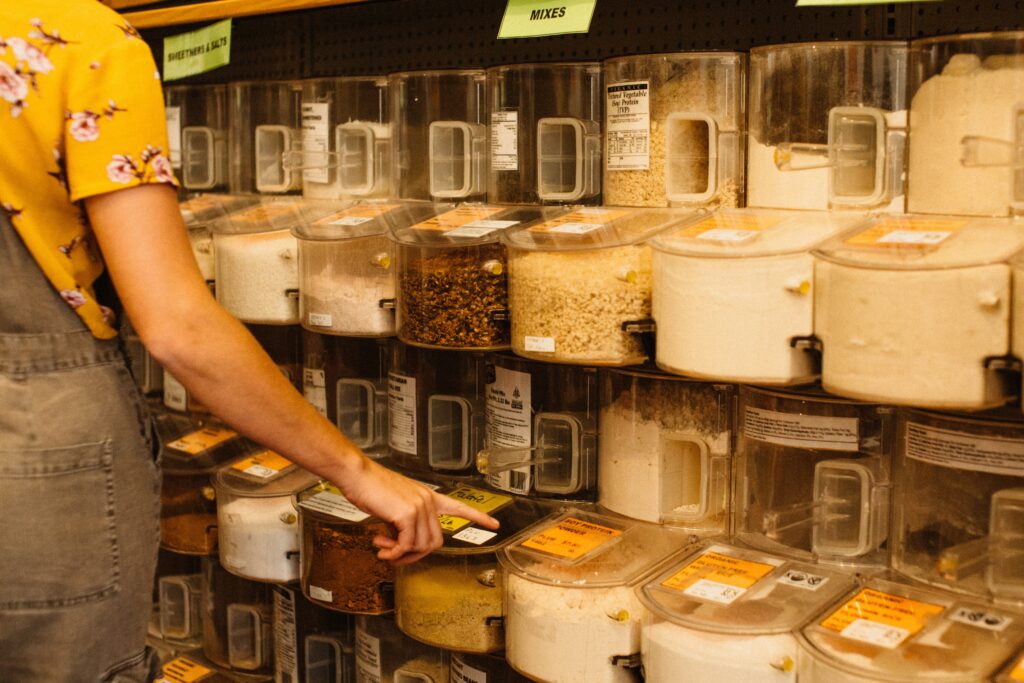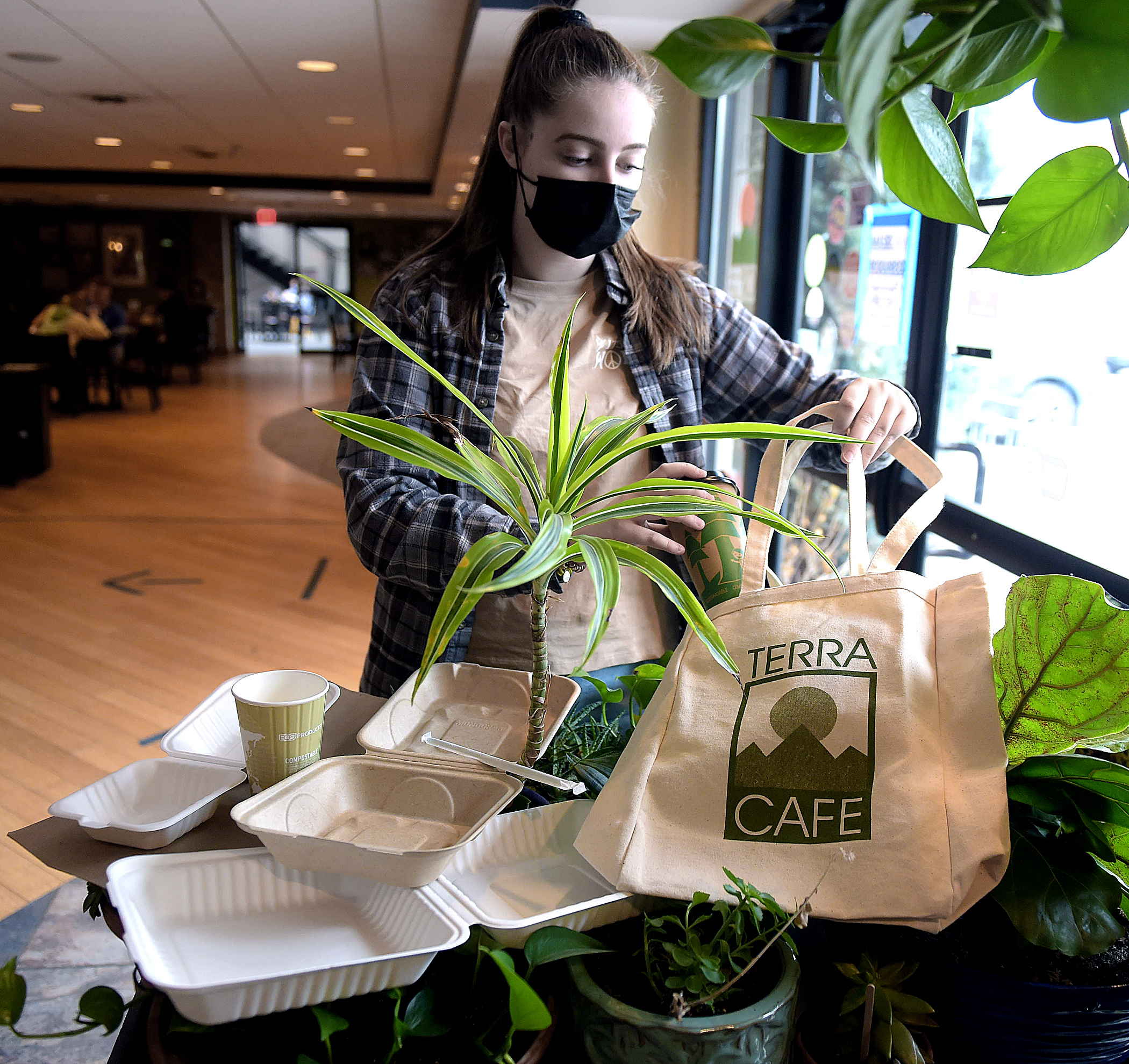Morgantown area businesses are making efforts to reduce their plastic usage and recycle whenever possible.
Three businesses in particular are striving to keep their establishments as environmentally conscious as possible, despite the notable economic challenges of the COVID-19 pandemic.
Dana Hantel, general manager at Mountain People’s Co-op, said the market has made many efforts to eliminate extensive usage of plastic products and offers plastic alternatives for sale.
Hantel said some of the plastic alternative products to choose from at Mountain People’s Co-op are shampoo, lotion and shave soap bars packaged in cardboard, and bulk handmade soaps provided by different local artisans.
Mountain People’s Co-op also sells laundry detergent in bulk so customers can bring their own reusable containers, such as glass jars, and refill them at the store.
Hantel said the store also has an expansive bulk foods section that includes rice, beans, flour, grains, nuts, granola, herbs and spices, teas, sugar and salt.
“Pretty much all of those pantry staples, whenever possible, we have a bulk version instead of, or in addition to, a packaged version,” Hantel said.
Hantel said under normal circumstances, customers would bring personal containers to Mountain People’s Co-op and refill those containers with however much they needed of whatever they needed, which cut down on packaging and provided quantity flexibility.
During the COVID-19 pandemic, however, the process changed. Customers are now asked to drop off containers for co-op staff to sanitize and fill with products like maple syrup or honey, which can’t be packaged in paper bags.
“Whenever possible, we use paper instead of plastic. Every now and then, there’s something that we do need to use plastic [for], but we try to get the least damaging type of plastic we can get in those cases,” Hantel said.
Hantel said Mountain People’s Co-op is working to find solutions to its already minimal plastic packaging problem through research and conversation with partners.

One option, according to Hantel, was incorporating compostable plastic packaging, but the establishment wasn’t satisfied with merely switching to a different type of plastic.
Another alternative, which is still being researched and reviewed by the co-op, is plant-based packaging.
Meanwhile, another business has found it difficult to manage its plastic usage since the increase in popularity of takeout orders due to COVID-19.
Matt Showalter, co-owner of Black Bear Burritos, said the restaurant has been recycling as many materials, such as plastic mayonnaise tubs, as they can “since day one.”
“[Another] thing that I think we do to try and cut down on that overall plastic waste, is to try to address it from the usage side,” Showalter said.
He said the restaurant started purchasing products like compostable straws after being surprised by how many of those items were being thrown away by the end of the day.
Regarding the increase in plastic usage stemming from more frequent takeout orders during the pandemic, Showalter said that is a different story.
“We wish we could do more because, again, like the image of all the straws collected at the end of the night and put into the trash — it’s kind of the same thing when we look at the amount of product we’re sending out the door and the amount of material that it takes to package each of those things to go carry-out … it is shocking to us,” Showalter said.
Showalter said he still believes the restaurant has tried its best to put forth more resources and invest in products with less of a negative impact on the environment, such as compostable clamshell containers rather than Styrofoam ones.
“There are a couple aspects that I hate to have to admit that we haven’t really found a solution for,” he said.
Black Bear Burritos hasn’t found an alternative to the thin plastic bags takeout containers are often packaged in, he said.
“It’s our hope that people save those and recycle those at the local grocery store; like Giant Eagle, for instance, has a collection bin for those. We hope that people are recycling those, because they do add up fast and they do build up,” Showalter said.
He said the environmentally friendly alternatives to those bags aren’t within the restaurant’s price range, but they try to use paper bags rather than plastic bags whenever possible — which isn’t always, since staff members are often carrying multiple takeout orders at a time.
Showalter said Black Bear Burritos compensates someone to haul their recycling.
He said he hopes customers consider their role in reducing plastic waste as well and views recycling as a team effort.
“We hope that everybody else identifies the efforts that a business like us, and so many other businesses make, and they continue that trend by taking [plastic products] … and taking that extra step, and taking it to one of the recycling facilities,” Showalter said.
Terra Café Manager Dylan Gain said the café recycles cardboard products weekly through the city of Morgantown and Republic Services, but does not recycle plastic products.
“We try to use as little [plastic] as possible by not using straws and [doing] preventative things that we can do,” Gain said.
Gain said the most frequently recycled cardboard items are the large boxes that front-of-house and back-of-house materials are shipped in.
Gain said the café’s takeout orders, and subsequently its plastic usage, have increased since the onset of the COVID-19 pandemic, but Terra Café is still trying to reduce its plastic waste output by using to-go boxes made of sugarcane, despite the environmentally friendly alternatives being far more expensive.
Terra Café has also started using paper bags rather than plastic ones for takeout orders and recently stopped offering straws to accompany to-go beverages.
“Any sort of plastic corners we can cut, we do,” Gain said.
Bridget Moreland, owner of Uptown Cheapskate, said her business is all about recycling and sustainability.
Moreland said because Uptown Cheapskate is a resale store, it helps keep clothing items out of the landfills.
According to Moreland, 80% of the items in the store are used products bought from the public for either cash or store credit.
“We’re keeping those clothes out of the landfill and giving them a second life, and allowing our shoppers to afford some of the brands that they wouldn’t necessarily be able to afford brand-new in the mall,” Moreland said.
Even the clothing Uptown Cheapskate chooses not to resell doesn’t go to waste –— Moreland said the store has partnered with a local Native American reservation, which receives any donated clothing that doesn’t end up on Uptown Cheapskate’s racks.
Moreland said many of Uptown Cheapskate’s shoppers are eco-conscious and don’t want to contribute to fast fashion, the production process of which contributes to waste in landfills and carbon emissions.
Customers at Uptown Cheapskate are encouraged to “go bagless” when they shop to avoid contributing to the plastic waste problem by throwing away thin plastic bags.
“We donate the cost of that bag to charity when they choose to go bagless,” Moreland said.
Additionally, Uptown Cheapskate’s annual Charity Fill-a-Bag event — where customers can pay $20 to fill a bag with as much clothing as they can fit inside — donates 100% of its proceeds to Build On.
Moreland said Uptown Cheapskate keeps poster up in the store to present customers with information regarding the effects of fast fashion production and sale.
“We’re trying to curb some of [those effects] and teach people to be more responsible in their shopping … by shopping resale. It’s just more of an ethical choice,” Moreland said.
TWEET @DominionPostWV




